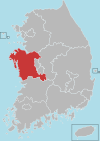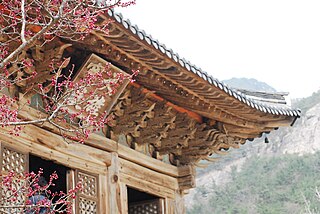
North Jeolla Province, officially Jeonbuk State, is a Special Self-governing Province of South Korea in the Honam region in the southwest of the Korean Peninsula. Jeonbuk borders the provinces of South Chungcheong to the north, North Gyeongsang and South Gyeongsang to the east and South Jeolla to the south.
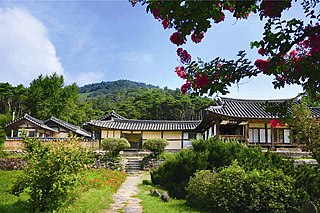
South Chungcheong Province, also known as Chungnam, is a province of South Korea in the Hoseo region in the southwest of the Korean Peninsula. South Chungcheong borders the provinces of Gyeonggi to the north, North Chungcheong, Sejong Special Self-governing City, and Daejeon Metropolitan City to the east, and North Jeolla to the south.
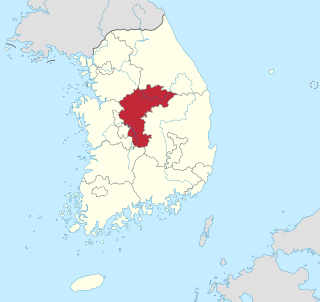
North Chungcheong Province, also known as Chungbuk, is a province of South Korea. North Chungcheong has a population of 1,578,934 (2014) and has a geographic area of 7,433 km2 (2,870 sq mi) located in the Hoseo region in the south-center of the Korean Peninsula. North Chungcheong borders the provinces of Gyeonggi and Gangwon to the north, North Gyeongsang to the east, North Jeolla to the south and South Chungcheong, Sejong Special Autonomous City and Daejeon Metropolitan City to the west.

Chungcheong was one of the eight provinces of Korea during the Joseon Dynasty. Chungcheong was located in the southwest of Korea. The provincial capital was located at Gongju, which had been the capital of the kingdom of Baekje from 475 to 538.

Jecheon is a city in North Chungcheong Province, South Korea. The city is a major railway junction or a transportation mecca, served by the Jungang, Chungbuk and Taebaek Lines. Jecheon has scenic surroundings and several tourist spots like the Uirimji Reservoir, Cheongpung Lake and Cheongpung Cultural Properties complex. It is also the home of Semyung University.
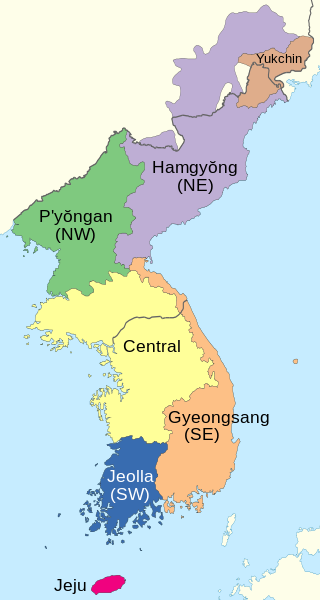
A number of Korean dialects are spoken on the Korean Peninsula. The peninsula is very mountainous and each dialect's "territory" corresponds closely to the natural boundaries between different geographical regions of Korea. Most of the dialects are named for one of the traditional Eight Provinces of Korea. Two are sufficiently distinct from the others to be considered separate languages, the Jeju and the Yukjin languages.
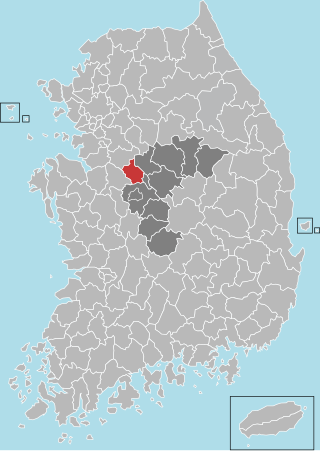
Jincheon County is a county in North Chungcheong Province Province, South Korea.

Anseong is a city in Gyeonggi Province, South Korea, 80 kilometres (50 mi) south of Seoul. Its geographical location is 37°0′N127°16′E.

Provinces are one of the first-level divisions within South Korea. There are 9 provinces in South Korea: North Chungcheong, South Chungcheong, Gangwon State, Gyeonggi, North Gyeongsang, South Gyeongsang, North Jeolla Province, South Jeolla, and Jeju Special Self-Governing Province.
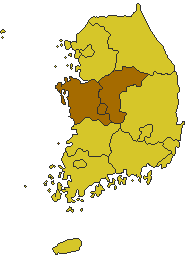
Hoseo is a region coinciding with the former Chungcheong Province in what is now South Korea. Today, the term refers to Daejeon, Sejong City, South Chungcheong and North Chungcheong Provinces. Hoseo people use Chungcheong dialect. The name is often used to refer to people residing in the region. Nowadays Chungcheong is more frequently used instead of Hoseo. The region will host the World University Summer Games in 2027.

Seongdong District is one of the 25 gu which make up the city of Seoul, South Korea. It is situated on the north bank of the Han River. It is divided into 20 dong (neighbourhoods).

Sejong or Sejong City, officially Sejong Special Self-Governing City (세종특별자치시), is a special self-governing city and the de facto administrative capital of South Korea.
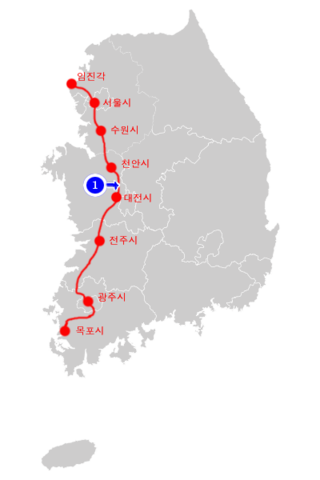
National Route 1(Korean: 국도 제1호선; RR: Gukdo Je Il Hoseon) is a national highway in South Korea. It connects Mokpo, South Jeolla Province with the city of Paju in Gyeonggi-do. Before the division of the Korean peninsula, the highway ran until Sinuiju, North P'yongan Province, in present-day North Korea.

The Chungcheong dialects of the Korean language are spoken in the Chungcheong (Hoseo) region of South Korea, including the metropolitan city of Daejeon. It may also include several areas in Gyeonggi Province, most notably Pyeongtaek, that are adjacent to Chungcheong Province. Chungcheong dialect can be divided into two categories: the Northern Chungcheong dialect, notable for its similarity to the Gyeonggi dialect, and the Southern dialect, which is similar to the Jeolla dialect. This dialect is notable for its slow enunciations, vowel changes, and unique jargon. However, as Seoul expands and standard language supremacy spreads, young people in Chungcheong Province, including Daejeon and Sejong, do not use original dialect, or use very little of it. Most young people use standard language and dialect alternately, and in cities located just below the Seoul metropolitan area (Sudogwon), like Cheonan, dialect is on the verge of extinction.
National Route 36 is a national highway in South Korea connects Boryeong to Sejong City, Cheongju, Chungju, and Uljin. It established on 31 August 1971.
National Route 17 is a national highway in South Korea. It connects the city of Yeosu to the cities of Suncheon, Namwon, Jeonju, Daejeon, Cheongju, and Yongin.
National Route 43 is a national highway in South Korea connecting Sejong City to Kosong County. It was established on 31 August 1971.
National Route 23 is a national highway in South Korea connects Gangjin County to Dongnam District, Cheonan. It established on 31 August 1971.















